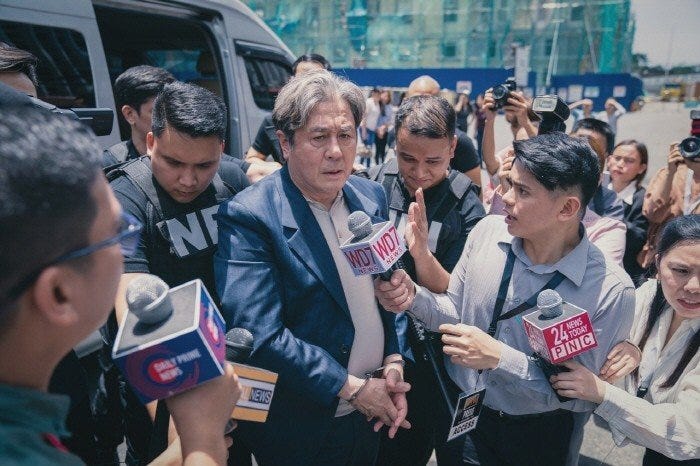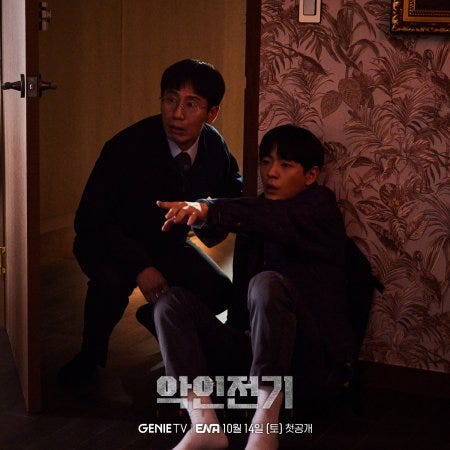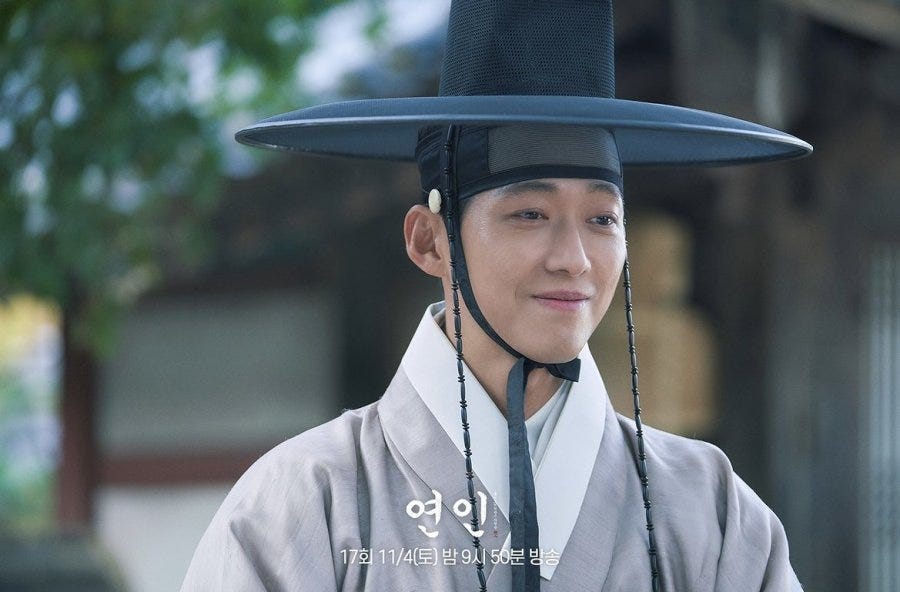My Week in Dramas (2023) 7 November 2023
Big Bet (2023); Evillive (2023); My Dearest Episode 17; Family: The Unbreakable Bond
It’s gangster season. At least our place. And on my laptop. With the completion of Big Bet last week, it’s my fourth drama this year involving gangsters. Out of all of them, I’d say that Big Bet is arguably the one that’s most unique and best executed although Evillive is proving to be a bit of a dark horse due to the acting heft of the leads. Choi Min-sik who hasn’t done tv for over two and a half decades signed up for this one for good reason. It’s certainly a role worthy of a highly acclaimed screen veteran. He plays an older Cha Moo-sik, a clever rebellious youngster dealt a poor hand at birth using his street savvy to eventually become a casino heavyweight in the Philippines. The set-up (Moo-sik’s backstory) which lasts about 3-4 episodes is worth persevering through as it lays the groundwork for what takes place once Moo-sik gets a taste of the Filipino pesos. Our protagonist begins his entrepreneurial habits on home soil with a series of illegal gambling dens. When the tax office comes knocking, he absconds for safer pastures. Once he settles down in the Philippines, his leadership skills and quick wits see him join hands with Chairman Min (Kim Hong-pa) at one of the local high end casinos. In order to establish himself Moo-sik pays obeisance to Big Boss Daniel, the country’s primary powerbroker regardless of who gets elected. With that much clout behind him, Moo-sik hits the jackpot and the sky’s the limit. That is until Korean nationals are found dead in the Philippines. Enter Major Oh Seung-hoon (Son Suk-koo) an errand boy sent by Interpol. He is tasked as a liaison with the local cops to deal with crime issues related to Koreans living in or visiting the country. It doesn’t take him long for him to ruffle the feathers of certain members of the Korean immigrant community who would rather not have him poking around too much. He’s a babe in the woods (or the jungle) and he has his Death in Paradise induction when the plane hits the tarmac.
Hustling is the name of the game. It’s what most of the characters do here for that big score that will see them live out the rest of their existence without having to lift a finger. Often it’s done with other people’s money until the well runs dry. Yes, like every K drama of this type it is about the obsession with money and the terrible thing people would do for it. It is greed with a capital “G” but all the deadly sins are on display as par for the course. When greed takes over anything goes. Cha Moo-sik epitomizes the hustling grifting impulse that energizes the world that he inhabits. He wears the cloak of respectability as a casino owner in a performance of a lifetime but rip off the mask he is no better than a street thug. Cha Moo-sik’s memoir of a self-made man gradually turns into a tale of hubris. His attachment to money is scarcely different from the unsuspecting highroller that he grooms into a gambling addict. It leads to a loss of self-control and the escalation of violence. He’s not a protagonist that one roots for. In fact there are no heroes in this story, just characters with competing agendas and changing bedfellows.
The plotting is certainly on a level comparable with Shadow Detective albeit without the suspense and intrigue. The performances from a host of well-regarded character actors are reliably great. Lee Dong-hwi who plays Jung-pal is something of a revelation as I’m new to his body of work. The great thing about these performances is that no one in this landscape believe that their fixation with money is dysfunctional whatsoever. Even when they pull the trigger in desperation. Hence human life has no life beyond their transactional value.
Big Bet has been in part a casualty of a misguided experiment by the streaming platforms of splitting dramas into two parts. It’s been a nightmare marketing exercise. The need to garner subscriptions is likely behind though it doesn’t reflect how people view K dramas conventionally especially considering the volume of dramas now being churned out . It’s been largely to the detriment of the shows involved. But can someone also please kindly inform SBS that the once-a-week model on top of scheduling conflict that they’ve introduced for The Killing Vote is killing people’s interest in that drama.
Gambling also plays a role in wealth creation in Evillive. Shin Ha-kyun and Shin Jae-ha play brothers Han Dong-soo and Han Beom-jae. They are doing it tough as a result of a suspension imposed on Dong-soo most likely because of a stance he took against his old workplace Moon Law Firm. In an attempt to extricate themselves from the sinister clutches of gangland leader Seo Do-young (Kim Young-kwang), Dong-soo devices a gambling scheme guaranteed to make everybody concerned a lot of money. Enough so that he and his family can leave the country and make a fresh start elsewhere. As in the case of all these gangster stories, it becomes clear that the show’s protagonist enters a faustian pact — a deal with the devil. The morally upright Dong-soo signs up with Seo Do-young first to get him off his back and then as a reluctant collaborator to escape the grind forever. As their relationship develops, Dong-soo begins to question his own moral certainties as a qualified legal practitioner. The rich and the powerful of his acquaintance get away with literal murder while for those at the bottom of the food chain it is a constant struggle to live out a hand to mouth existence. There is injustice but the question of directing hard power to the task of dislodging the status quo becomes an attractive option for a man exhausted from fighting the good fight the way he was trained to.
There is something inherently attractive about Seo Do-young despite the terrifying explosions of violence. He at least understands loyalty and obligation. He also understands what’s been suppressed in Dong-soo and is quite willing to manipulate the latter for his own ends. But what has he unleashed? Well, that’s still an unknown up to this point. Could it be that he has released a monster that he himself will ultimately have no control over?
Shin Ha-kyun is as always superb as he disappears under the skin of the Everyman lawyer, bumbling his way into one crisis after another. I will watch him in anything. Despite the horrified timidity he wears Han Dong-soo is an intelligent man armed with the law and insights into human psychology. Kim Young-kwang who plays his foil and sometimes ally Seo Do-young provides the right balance of charm and cunning menace
As a postscript, it should be noted that gambling also acts as a metaphor for how men and women in this type of story position themselves in the story of the world. In general they aren’t guided by moral principles of right and wrong but of winning and losing in a life or death proposition. Who indeed will come out on top? It’s not unlike Squid Game in that regard — a battle to the death and the last man standing takes all. Fortune may favour the brave. But while the rewards may be high, the risks are enormously higher.
Everyone loves Jang-hyeon in My Dearest and I emphasize “everybody”. It strikes me always that his likeability is rooted in his unconventional ways. Even as a young man, he rescued boy Ryang Eum, who was in all probability horribly abused as a sex slave. Jang-hyeon then went on to raise him to adulthood. Even when Gil-chae tells him frankly that she’d been humiliated by the barbarians (whatever that means by their lights), his heart is immediately moved to comfort her. In a series of utterances that come together like a marriage vow, he confesses and pledges his undying love for her. She’s the one he didn’t know he was waiting for. So his commitment phobia was simply due to the fact that he just hadn’t right met the right woman for him. When he finally meets her, a change of attitude gradually takes place. Once the two of them were too proud or too afraid to be truthful to each other but after overcoming one hurdle after another, through the crucible of war and captivity honesty can now flower between them. As he says with renewed resolution, there’s really nothing now to hold them back. Free to tell him what’s holding her back, he is free to reassure her that like always, it doesn’t make an iota of difference.
Jang-hyeon continues to serve as a contrast to the men of his day but most especially the man they call the king. Unlike the man who sits on the throne bellyaching about the state of things, Jang-hyeon is the Man of the people. He exemplifies that ethos by doing the best he can for them under the precarious circumstances in which they live. He is mentor to the once wet-behind-the-ears crown prince. He has given up a sizeable amount of his wealth to saving as many captives as possible. He flirts with the barbarians and does deals with them. He is the man that his own country doesn’t deserve but needs. A man out of time at the right place at the right time in history.
Family: The Unbreakable Bond. Where do we even begin with this? Suffice to say, it’s a misguided and ultimately failed attempt to combine multiple genres that don’t normally mix. What results is (at least) the mishandling of possibly three different stories that have been done before in far better hands. Sure it’s occasionally funny and heartwarming but given that there’s a strong espionage vein that has a backstory of training children as assassins, the family hijinks is a clumsy mismatch at best. The writer/director seems unable to pull everything together seamlessly. Structurally it’s incoherent and not a lot about the premise fundamentally makes sense. Why would the South Korean government be sponsoring a secret training programme involving orphan girls and boys as young as eight or nine? I don’t think that was ever made clear. Infiltration? How? Where? Experimenting on children to enhance their abilities is one thing but training them to be future operatives under such draconian conditions is another. And weapons training? How were they supposed to be deployed? But that’s not the worse part. What’s the point of Jang Hyuk’s younger brother and sister-in-law? Purely comic relief? Because they were both insufferable nitwits from start to finish. Neither of them had much to do with the espionage angle nor did they contribute to its resolution. Moreover his father’s attempts to move on with different women after the death of their mother is supposed to add a dose of humour to an otherwise sobering subject but again it falls flat because it has no connection with the rest of the show.
The cast seems to have enjoyed themselves in this romp although I dare say that they were poorly served by the overall execution. A good notion based on a first draft script. It’s oddly watchable (probably due to Jang Hyuk and Jang Na-ra) but schizophrenic.
If you enjoyed this and found the post useful, please like, comment and subscribe.




